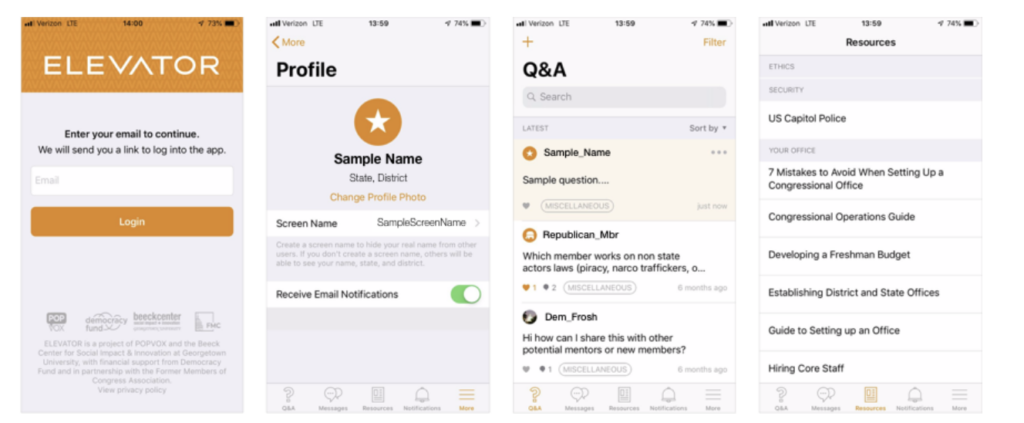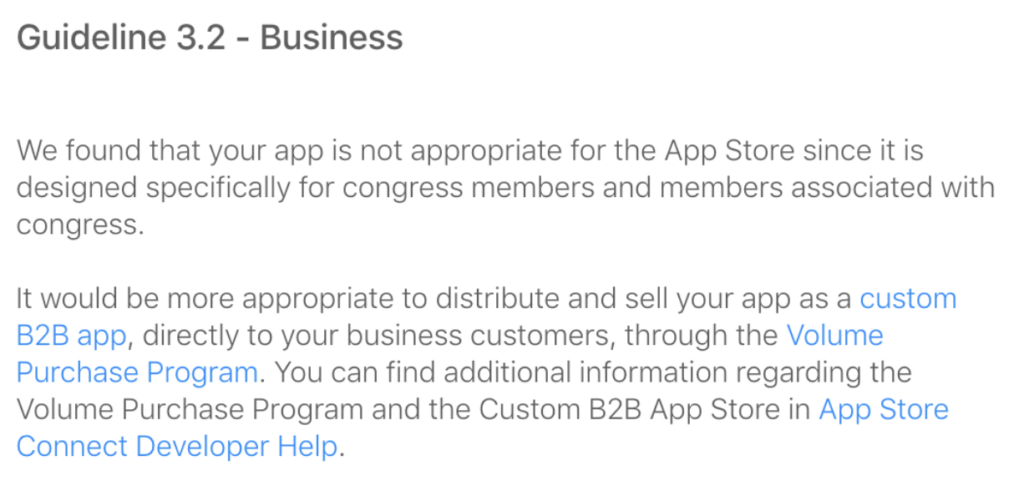Recommendation to Select Committee on the Modernization of Congress: Establish “Bulk Purchase” Accounts for App Ecosystems
June 14, 2019 | Lorelei Kelly & Marci Harris (POPVOX)
Problem:
The workflow of Congress presents unique challenges, many that could be effectively addressed with technology. In some cases, a mobile application — an “app” — is an ideal delivery medium. Major app ecosystems — such as the Apple IOS App Store or Google’s Android “Play” Marketplace — allow either for apps to be (1) available in the public app store for all, or (2) to be built as an “enterprise” app for a specific client that is enrolled in the ecosystem’s “bulk purchase” program. At least with Apple, there is no effective way to distribute limited or “private” apps outside of this program.
Neither Congress nor individual chambers of Congress (House or Senate) are currently enrolled in this bulk purchase program. This means that any app built for Congress — whether for staff use or for lawmakers — must be made available in the public app store. The Apple App Store approval process requires that a minimal set of features be available to all users. This means that currently any app built to solve a Congress-specific problem or address a Congressional workflow need must also provide a minimum set of features to the general public — even if they are not the intended user — in order to be approved for the public app store.
This is problematic for several reasons:
- Scarce resources allotted for creating technology for Congress must also be expended to create a public-facing experience, even if the public is not the intended end user of the app.
- Availability in the public app store presents unnecessary risk of hacking and phishing attacks by making technology intended for Congressional use visible and accessible by non-Congressional actors.
Recommendation:
Require the establishment of “bulk purchase” institutional accounts with major app marketplaces (IOS and Google Play) to allow for the development of enterprise applications specifically for Congressional use — either through the Office of the Clerk, Office of House Administration, Senate Sergeant at Arms, or a new “Innovation Office” within Congress.
App Examples:
Several apps have been attempted or created over the years with the intent of addressing internal Congressional needs. These apps effectively navigated the requirement to make features available to the public in order to serve Congress, but not without challenges:
- Capitol Bells: Developed by Ted Henderson and launched in 2014, Capitol Bells was an ingenious solution for providing vote updates to Members of Congress. Mimicking the arcane “bells” that buzz on Congressional clocks — which Select Committee chairman Kilmer [D, WA] has described as “some kind of combination of Morse code and a Ouija board” to signal votes — Capitol Bells had to find a way to receive the bell indications. These are only sent to the Congressional clocks from the Architect of the Capitol and no electronic indicator exists (thought that might soon change). Hundreds of members and staffers — and members of the public — began using the app to receive vote updates bill information. Unfortunately, the public-facing nature of the app also caused the House Chief Administrative Officer (CAO) to briefly shut down access to the app in 2016, amid fears of ransomware attacks. If, however, the app had been able to exist as a “Congress-only” enterprise version (which would not preclude a public-facing version in the public app store), concerns about phishing and unauthorized access would have been greatly diminished.
- Cloakroom: Following on the success of Capitol Bells, Henderson launched a new app, Cloakroom, in 2015 to facilitate informal communications on Capitol Hill — a place for staffers to have an anonymous chat to share news, questions, and even jokes. Ideally, the system would have been closed to prevent any outside access but, again, that would violate app store requirements. Therefore Henderson provided a set of public-facing features for anyone to use, allowed geofenced access to anyone on the Capitol Hill wireless networks, and allowed individuals off the Hill to submit a request to access Cloakroom.
- WhipWatch (Now “DomeWatch”): Also in 2015, then-Minority Whip Steny Hoyer’s [D, MD] office launched an app to provide vote notifications to lawmakers. Of course, as the “whip,” the vote notifications were intended to be for members of his caucus, but due to App Store requirements, the app was made available to the public — and used by members on both sides of the aisle. With 50,000 downloads since version 1.0, it has been an unquestionable success, adding live vote tallies in its 2.0. While a caucus whip normally does not publicize how he or she wants members to vote, Hoyer’s staff began to view and message the (unavoidable) public availability as a “feature-not-a-bug,” providing greater transparency to the legislative process for all. In 2019, now-Majority Leader Hoyer re-released the app under a new name, “Dome Watch,” now includes a high-definition live stream of the House floor and is available on Android and desktop. (Notably, the underlying functionality of DomeWatch requires some creative “civic hacking” because the House Clerk’s office does not offer an electronic source of live vote information. DomeWatch system live-streams and “scrapes” the vote information from the Congressional closed-circuit television to provide updated counts.)
The need for “Congress-only” apps: POPVOX Elevator example
In 2018, the Beeck Center for Social Impact + Innovation at Georgetown University began to explore ways to provide better resources for what would become the incoming class for the 116th Congress. During the course of her field research, Fellow Lorelei Kelly asked multiple members and staffers for suggestions on how to improve the orientation and transition phase from election to swearing-in, in a way that encouraged bipartisan relationships and mentoring. Representative Jim Cooper [D, TN] noted that new members benefit from safe and private connection with long-time members. He thought that it would be important to create more opportunities for collegiality and friendship among freshmen before the political parties captured so much of a new member’s time and attention.
With support from Democracy Fund, Beeck partnered with POPVOX to develop the concept and build an app based on the initial idea from Rep. Cooper. Kelly enlisted the help of the Former Members of Congress Association to bring on bipartisan “mentors” who agreed to participate and answer questions on the app.
The app was named “Elevator,” a play on the fact that many members actually meet and get to know each other on Capitol Hill at the Members Only-elevator as they rush off to votes. The app spec was intentionally simple: (1) a discussion board where participants could raise new topics or questions, reply to each other, and “like” the responses of others; (2) private, encrypted messaging between individuals; (3) push notifications; and (4) a list of resources for new members. The POPVOX team developed a verification system that limited signup to lawmakers or former lawmaker mentors with email addresses in the POPVOX system.

The app was completed and submitted to the Apple app store on October 27, 2018. It was rejected by Apple on November 3 because signup was limited to newly-elected members-elect and verified former member “mentors.” It was resubmitted on November 4 with an explanation of the need to limit access to Congress — but again rejected.

It was resubmitted on November 8 with the ability for public sign-in for limited access to the “resources” page. Apple then rejected the app again because it claimed that the list of resources was not enough public functionality to satisfy the minimum requirements of the app store. (Of course, significant functionality existed for members-elect and mentors, but was not available to the public.)

The Elevator team then worked with Georgetown’s Chief Technology Officer to have the app listed as an “educational” app through Georgetown’s educational account, which would require the distribution of Georgetown access codes to members. It was resubmitted as an educational app, and then inexplicably showed up on the public Apple store with no forewarning a few days later (in mid-December). By this time, the window to reach members in their transition phase had passed. The team has held off on additional updates to the app because it is almost certain that upon review for updates, Apple will again remove the app from the public app store.
While the app itself was ready for use and built to address an important need, the limitations of the public app store thwarted the ability to distribute and optimize the app during the crucial transition period for members-elect.
The team stands ready to re-release the app for Congress (and for other uses that members requested: special versions for Congressional spouses and chiefs of staff, for example) if and when Congress establishes a bulk purchase account. Until then, however, the approval requirements to make the apps for Congress available in the public app store or work with educational partner for closed distribution are too onerous to make the project successful.
Elevator is just one example of the kind of functionality that makes sense to have in a Congress-only app, among many. Committees have frequently expressed a desire for apps that would enable information dissemination and discussion among staffers of committee members. Basic Congressional operations such as scheduling, travel, procurement, and security updates could be more securely handled through closed apps developed specifically for the institution. Establishing the ability to build enterprise apps for lawmakers and staffers — as organizations and businesses frequently do for their own employees––is a basic and important step towards “modernizing” Congress.
Lorelei Kelly is a Fellow and leads the Resilient Democracy Coalition at the Beeck Center for Social Impact + Innovation at Georgetown University.
Marci Harris is co-founder and CEO of POPVOX, an online platform for legislative information and civic engagement.